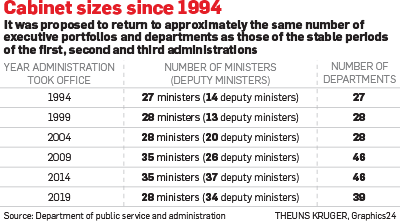The public service department is set to face off with labour over staff retentions as executive reshuffle takes shape
Public Service and Administration Minister Senzo Mchunu is looking to reach a much-needed agreement with labour this week over the future of staff, as part of processes involved in the macro reconfiguration of the state.
The reconfiguration process, which got under way in May – after President Cyril Ramaphosa announced the merger of certain departments and the reallocation of portfolios – is set to be completed in March next year.
Mchunu is now faced with the delicate balancing act of cutting the wage bill, while retaining much-needed skills in the public service and overseeing the transfer of staff to the newly restructured departments.
Last week, he appeared before the parliamentary portfolio committee on public service and administration, alongside the department’s director-general, Richard Levin.
The two men faced a barrage of questions from committee members seeking clarity on the matter.
Despite talks by the fifth administration (2014) of severance packages that were to be offered, Mchunu and Levin were adamant that no jobs would be lost in the process.
“Government is committed to ensuring that public servants are not negatively affected by the changes. The jobs of public servants remain safe,” Levin said.
This is despite an acknowledgment that the cost of bloated support staff was a challenge for the department.
“Due to frequent changes of creating new departments, the transfer of functions between departments and the merging of departments over the last two decades, the size of Programme 1 [support services] has become bloated and costly,” Levin told the committee.
“Most departments – 73%, or 31 national departments – spend 30% or more of their total compensation budget on cost of employment for Programme 1.”
Levin said that the figure needed to be closer to 20%: “A maximum of 20% of the total cost of employment for Programme 1 is a much more acceptable ratio to prioritise compensation funding for line functions.”
He was also at pains to communicate that the offer of early retirement to those aged between 55 and 60 had nothing to do with “downsizing”.
“The particular dispensation, which is currently being discussed with labour, is really about the penalties that apply when you take that retirement being covered. The aim was never about downsizing.
“The aim of the early retirement – as it evolved with the current finance minister during the fifth administration, and the stance of the previous finance minister – was to see whether we could find ways to bring more young people into the public service, because the wage of a young person entering at entry level is a lot less than a public servant who has served for their entire life, or a substantial proportion of it, and is now retiring.
“So, it is not a severance, it is not a retrenchment ... It is a mechanism which was looked at as a way of trying not to reduce head count, but allowing young people in and maybe making savings on the salary bill.”
Levin said that at last week’s meeting with the Public Service Coordinating Bargaining Council, the department would have to discuss “a social plan with migration and placement critera”, which would involve the following: how affected employees would be accommodated; ways of accommodating employees where posts are duplicated; their possible transfer to other organs of state; the reskilling of employees for current functions; and natural attrition.
In the fifth administration under then president Jacob Zuma, there was a total of 46 departments, with 35 ministers and 37 deputy ministers.
In the reconfigured structure of the sixth administration, there are 39 departments, with 28 ministers and 34 deputy ministers.
Levin red-flagged the growing number of deputy ministers since the first democratic administration, telling the committee that “the fifth administration saw an unprecedented growth of 164% in the number of deputy ministers compared with the first administration”.
“It should be noted that the deputy ministers do not have powers of an executive authority in terms of the Public Service Act, 1994 and the Public Finance Management Act, 1999. Very few pieces of legislation assign powers to deputy ministers,” said Levin.
“It was proposed to return to approximately the same number of executive portfolios and departments compared with the stable periods of the first, second and third administrations, 1994 to 2008.”
When asked by committee members why this recommendation had not been implemented, Mchunu appeared to shy away from the discussion, saying there was no use in debating political matters that were the prerogative of the president.
The first administration had 27 departments and ministers, with 14 deputy ministers; the second had 28 departments and ministers, with 13 deputies; and the third maintained the 28 ministers and departments, but again increased the deputies, this time to 20.
How do you think the department of public service and administration should contain its wage bill?
SMS us on 35697 using the keyword SENZO and tell us what you think. Please include your name and province. SMSes cost R1.50.
 | ||||||||||||||||||||||||||
Get in touchCity Press | ||||||||||||||||||||||||||
| ||||||||||||||||||||||||||
| Rise above the clutter | Choose your news | City Press in your inbox | ||||||||||||||||||||||||||
| City Press is an agenda-setting South African news brand that publishes across platforms. Its flagship print edition is distributed on a Sunday. |




 Publications
Publications
 Partners
Partners









